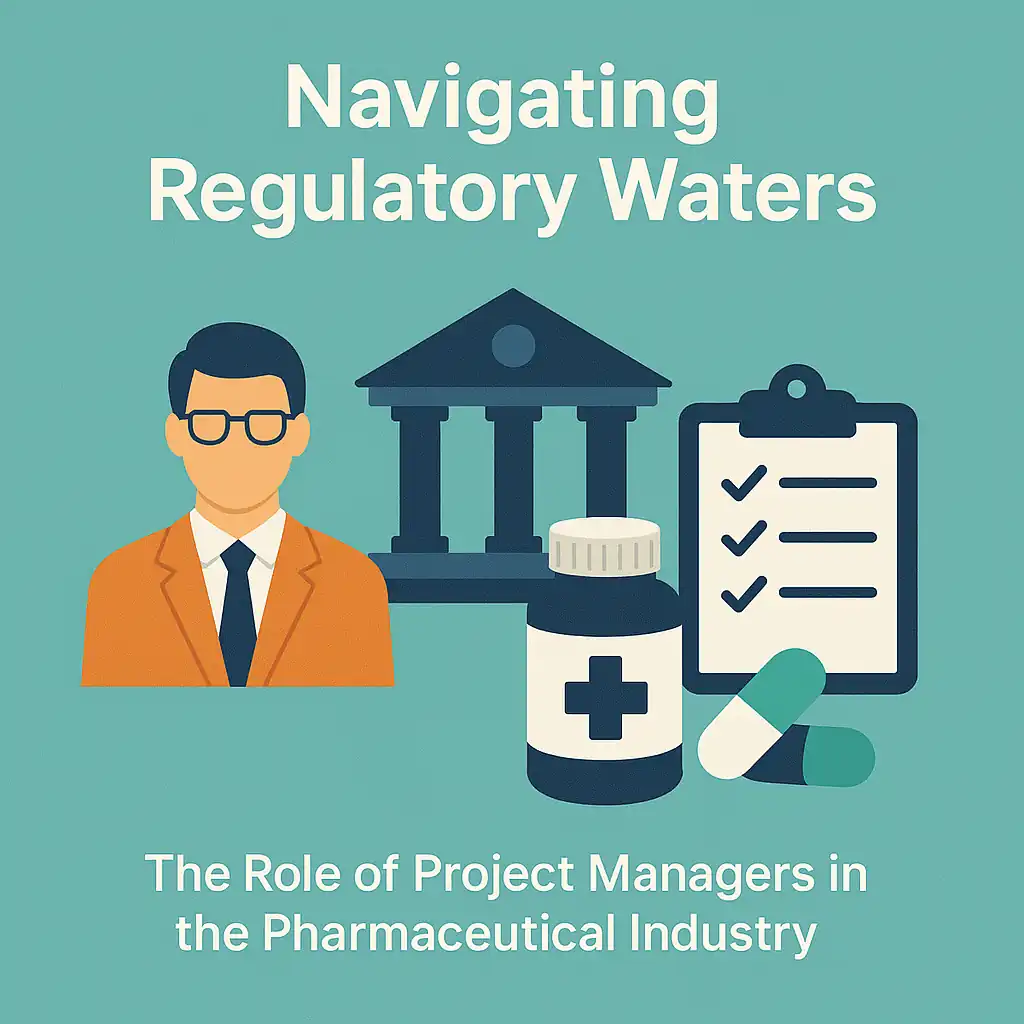Introduction: The Importance of Project Management in Pharmaceuticals
The pharmaceutical industry is characterized by its complexity and the critical need for compliance with stringent regulations. As this sector continues to evolve, project managers play an essential role in navigating the multifaceted regulatory landscape that governs drug development and distribution.
Overview of the Pharmaceutical Industry and Its Unique Challenges
The pharmaceutical industry faces a myriad of challenges, including resource limitations, the need for cross-functional team management, and the intricacies of regulatory compliance. Project managers must adeptly handle these challenges to ensure that projects are completed on time and within budget while meeting the necessary quality standards. The industry is also marked by its reliance on rigorous clinical trials and the necessity to recruit patients effectively, which adds another layer of complexity to project management efforts [2][3].
The Critical Role of Project Managers in Ensuring Compliance and Regulatory Adherence
Project managers in the pharmaceutical sector are tasked with maintaining compliance with various regulatory requirements. They must ensure that all project activities align with the standards set by regulatory bodies, which is crucial for the successful approval and market entry of new drugs. This involves proactive risk assessment and the implementation of mitigation strategies to minimize the impact of unforeseen issues that may arise during the project lifecycle [1][4]. Their role extends beyond mere oversight; they are responsible for leading cross-functional teams, balancing divergent objectives, and ensuring that all regulatory documentation is meticulously maintained and readily accessible [8][6].
Brief Introduction to Regulatory Bodies and Their Impact on Project Management
Regulatory bodies such as the U.S. Food and Drug Administration (FDA) and the European Medicines Agency (EMA) play a pivotal role in the pharmaceutical industry. These organizations establish the guidelines and standards that govern drug development, clinical trials, and market approval processes. Project managers must stay abreast of these regulations and understand their implications for project timelines and deliverables. The ability to navigate these regulatory waters effectively is essential for project managers, as it directly impacts the success of pharmaceutical projects and the overall health of the organization [3][5].
Understanding the Regulatory Landscape
Navigating the regulatory environment is a critical aspect of project management in the pharmaceutical industry. Project managers must be well-versed in various regulations and guidelines that govern drug development and ensure compliance throughout the project lifecycle. Here are some key points to consider:
Overview of Key Regulations:
- Good Practice Guidelines (GxP): These encompass a series of regulations that ensure quality in the manufacturing, testing, and distribution of pharmaceuticals. GxP includes Good Manufacturing Practice (GMP), Good Clinical Practice (GCP), and Good Laboratory Practice (GLP), all of which are essential for maintaining product integrity and safety throughout the development process [10].
- International Council for Harmonisation (ICH) Guidelines: These guidelines aim to ensure that pharmaceutical products are safe, effective, and of high quality. They provide a framework for the development and registration of new drugs, facilitating international collaboration and compliance [10].
Role of National and International Regulatory Agencies:
- Regulatory bodies such as the U.S. Food and Drug Administration (FDA) and the European Medicines Agency (EMA) play a pivotal role in overseeing pharmaceutical projects. These agencies establish the standards and requirements that must be met for drug approval and market entry. Project managers must engage with these agencies early in the development process to align their strategies with regulatory expectations, which can significantly influence project outcomes [8][12].
- Additionally, international standards and guidelines are increasingly important as pharmaceutical companies operate in a global market. Understanding the nuances of different regulatory environments is essential for project managers to ensure compliance across various jurisdictions [12].
Impact of Regulatory Changes on Project Timelines and Deliverables:
- The pharmaceutical industry is subject to frequent regulatory updates, which can have profound implications for project timelines and deliverables. Changes in regulations may require project managers to adapt their strategies, potentially leading to delays in development and increased costs [11][13].
- For instance, the emergence of new scientific advancements or public health crises, such as the COVID-19 pandemic, can prompt rapid regulatory responses that necessitate adjustments in project plans [14]. Project managers must remain agile and proactive in their approach to navigate these changes effectively, ensuring that their projects stay on track while meeting compliance requirements [6][15].
Key Responsibilities of Project Managers in Regulatory Compliance
In the pharmaceutical industry, project managers play a crucial role in navigating the complex regulatory landscape that governs drug development and approval processes. Their responsibilities are multifaceted and require a deep understanding of regulatory requirements, effective communication, and strategic planning. Here are the key responsibilities of project managers in ensuring regulatory compliance throughout the project lifecycle:
- Establishing Compliance Protocols and Timelines: Project managers are tasked with developing and implementing compliance protocols that align with regulatory standards. This involves creating detailed timelines that outline critical milestones and deadlines for regulatory submissions. By establishing these protocols, project managers ensure that all project activities adhere to the necessary legal and safety standards, thereby reducing the risk of non-compliance and associated penalties [2][3][11].
- Coordinating with Regulatory Affairs Teams and Stakeholders: Effective communication and collaboration are essential for project managers in the pharmaceutical sector. They must coordinate closely with regulatory affairs teams, which provide expertise on compliance issues and regulatory requirements. This collaboration extends to various stakeholders, including internal teams and external partners, to ensure that everyone is aligned on compliance objectives and that all necessary documentation is prepared accurately and submitted on time [10][11][12].
- Monitoring and Reporting on Compliance Status and Issues: Project managers are responsible for continuously monitoring the compliance status of their projects. This includes identifying potential compliance issues early in the process and implementing corrective actions as needed. Regular reporting on compliance status to senior management and stakeholders is also a critical responsibility, as it helps maintain transparency and accountability throughout the project lifecycle. By keeping all parties informed, project managers can facilitate timely decision-making and ensure that compliance remains a priority [5][8][13].
Strategies for Effective Regulatory Navigation
Navigating the complex regulatory landscape in the pharmaceutical industry is a critical responsibility for project managers. As regulations become increasingly stringent and patient needs evolve, project managers must adopt effective strategies to ensure compliance and facilitate successful project outcomes. Here are some actionable strategies for project managers to navigate these regulatory waters effectively:
- Developing a Regulatory Strategy Early in the Project Lifecycle: It is essential for project managers to establish a comprehensive regulatory strategy at the outset of a project. This involves understanding the specific regulatory requirements that apply to the project and aligning project goals with these regulations. By doing so, project managers can create a roadmap that anticipates regulatory hurdles and integrates compliance into the project planning process, thereby reducing the risk of delays and non-compliance later on [9][10].
- Utilizing Risk Management Principles to Anticipate Regulatory Challenges: Effective risk management is crucial in the pharmaceutical sector, where regulatory challenges can arise unexpectedly. Project managers should identify potential risks early in the project lifecycle, assess their impact, and develop mitigation strategies. This proactive approach allows project managers to address regulatory issues before they escalate, ensuring that the project remains on track and compliant with all necessary regulations [3][4].
- Leveraging Technology and Project Management Tools for Compliance Tracking: The integration of technology into project management practices can significantly enhance compliance tracking. Utilizing project management tools that offer features for monitoring regulatory updates, managing documentation, and facilitating communication among cross-functional teams can streamline the compliance process. These tools can help project managers stay informed about regulatory changes and ensure that all project activities align with current regulations [6][13].
By implementing these strategies, project managers in the pharmaceutical industry can effectively navigate the complexities of regulatory environments, ensuring that their projects not only meet compliance standards but also contribute to the overall success of their organizations.
Case Studies: Success Stories in Regulatory Project Management
In the pharmaceutical industry, project managers play a pivotal role in navigating the intricate regulatory landscape that governs drug development and approval. This section highlights successful projects that have effectively managed regulatory hurdles, shares lessons learned from compliance challenges, and outlines best practices adopted by leading pharmaceutical companies.
Successful Projects Navigating Regulatory Hurdles
- COVID-19 Vaccine Development: The rapid development and deployment of COVID-19 vaccines serve as a prime example of effective project management in a highly regulated environment. Companies like Pfizer and Moderna utilized agile project management techniques to streamline their processes, ensuring compliance with regulatory requirements while accelerating timelines. This project showcased the importance of cross-functional collaboration and real-time communication among teams to address regulatory concerns swiftly [10].
- Streamlined Drug Approval Processes: A notable case involved a pharmaceutical company that implemented well-coordinated guidelines to enhance its drug approval process. By adopting a proactive approach to regulatory compliance, the company was able to reduce development expenses and expedite market entry. This case illustrates how strategic planning and adherence to regulatory frameworks can lead to successful outcomes [7].
Lessons Learned from Compliance Challenges
- Communication is Key: Effective communication emerged as a critical factor in overcoming compliance challenges. A project that faced significant delays due to miscommunication among stakeholders highlighted the need for clear and consistent messaging. By establishing robust communication channels, the project team was able to realign their objectives and meet regulatory expectations, ultimately leading to project success [9].
- Adaptability to Regulatory Changes: Another project faced unexpected regulatory changes that threatened its timeline. The project manager’s ability to adapt and pivot strategies in response to these changes was crucial. This experience underscored the importance of staying informed about regulatory updates and being prepared to adjust project plans accordingly [6].
Best Practices Adopted by Leading Pharmaceutical Companies
- Comprehensive Risk Management: Leading pharmaceutical companies have adopted comprehensive risk management strategies to identify and mitigate potential compliance issues early in the project lifecycle. By conducting thorough risk assessments and developing contingency plans, project managers can navigate regulatory waters more effectively [8].
- Leveraging Technology: The integration of advanced project management tools has proven beneficial in managing regulatory compliance. Companies that utilize software solutions for tracking project milestones, documentation, and regulatory submissions have reported improved efficiency and reduced errors. This technological approach allows project managers to maintain oversight and ensure adherence to regulatory requirements throughout the project [14].
- Continuous Training and Development: Ongoing training for project teams on regulatory standards and best practices is essential. Companies that prioritize continuous education and professional development for their project managers and compliance officers are better equipped to handle the complexities of regulatory environments. This commitment to learning fosters a culture of compliance and enhances overall project success [5].
Collaboration Across Teams: The Key to Success
In the pharmaceutical industry, project managers play a crucial role in navigating the intricate regulatory landscape. Effective collaboration across various teams is essential for ensuring compliance and achieving project goals. Here are some key points that highlight the importance of teamwork in managing regulatory compliance:
- Engaging Cross-Functional Teams: Successful project management in pharmaceuticals requires the active involvement of cross-functional teams, including Research and Development (R&D), regulatory affairs, and quality assurance. Each team brings unique expertise and perspectives that are vital for addressing regulatory requirements and ensuring that products meet safety and efficacy standards. By fostering collaboration among these teams, project managers can streamline processes and enhance the overall efficiency of product development [6][9].
- Creating a Culture of Communication and Collaboration: Establishing a culture that prioritizes open communication and collaboration is essential for navigating regulatory challenges. Project managers should encourage regular meetings and updates among team members to share insights, discuss potential issues, and align on compliance strategies. This proactive approach not only helps in identifying regulatory hurdles early on but also promotes a sense of shared responsibility among team members, which is critical in a highly regulated environment [7][9].
- Establishing Clear Roles and Responsibilities for Compliance Tasks: Clarity in roles and responsibilities is paramount when managing compliance tasks. Project managers must define specific duties for each team member related to regulatory compliance, ensuring that everyone understands their contributions to the project. This clarity helps prevent overlaps and gaps in responsibilities, which can lead to compliance failures. By assigning clear roles, project managers can enhance accountability and ensure that all regulatory documentation is maintained accurately and up to date [4][5][9].
Future Trends and Challenges in Pharmaceutical Project Management
In the pharmaceutical industry, project managers play a crucial role in navigating the complexities of regulatory environments. As the industry faces increasing pressures from technological advancements and regulatory demands, understanding future trends and challenges is essential for effective project management. Here are some key points to consider:
- Impact of Digital Transformation and Automation on Compliance: The pharmaceutical sector is experiencing a significant shift towards digital technologies, which has transformed compliance processes. The adoption of automation in clinical trial management and data capture has streamlined operations, allowing project managers to enhance efficiency and accuracy in regulatory submissions. However, this transition also brings challenges, such as ensuring data privacy and integrating new technologies into existing systems. Project managers must be adept at leveraging these digital tools while maintaining compliance with stringent regulations [6][13].
- Anticipating Regulatory Changes and Preparing for New Standards: The regulatory landscape is continuously evolving, with new standards and guidelines emerging regularly. Project managers must stay informed about these changes and proactively adapt their strategies to ensure compliance. This involves not only understanding the implications of new regulations but also implementing processes that allow for flexibility and responsiveness. By fostering a culture of compliance and continuous learning within their teams, project managers can better prepare for upcoming regulatory shifts [10][11].
- The Role of Project Managers in Adapting to a Rapidly Changing Environment: As the pharmaceutical industry faces increasing complexities, project managers are tasked with leading their teams through uncertainty. This requires strong leadership skills and the ability to pivot quickly in response to new challenges. Project managers must cultivate resilience and adaptability, ensuring that their teams are equipped to handle unexpected regulatory hurdles. By embracing innovative project management methodologies and fostering collaboration across departments, project managers can effectively navigate the regulatory waters and drive successful project outcomes [5][14].
Conclusion: Empowering Project Managers for Regulatory Success
In the highly regulated pharmaceutical industry, project managers play a pivotal role in ensuring compliance and driving successful project outcomes. Their ability to navigate complex regulatory environments is essential not only for meeting legal requirements but also for fostering innovation and maintaining patient safety. Here are the key takeaways that underscore the importance of project managers in this context:
- Essential Role in Regulatory Navigation: Project managers are at the forefront of managing the intricate processes involved in drug development and approval. They are responsible for meticulous planning and coordination, which are crucial for adhering to stringent regulatory standards set by bodies such as the FDA and EMA. Their leadership in cross-functional teams ensures that diverse objectives are balanced without compromising compliance, ultimately leading to successful project delivery [2][4][11].
- Ongoing Education and Professional Development: The landscape of regulatory compliance is constantly evolving, making it imperative for project managers to engage in continuous learning. By pursuing professional development opportunities in regulatory affairs, project managers can stay updated on the latest regulations, best practices, and industry trends. This knowledge not only enhances their skill set but also equips them to tackle emerging challenges effectively [6][15].
In conclusion, empowering project managers with the right tools, knowledge, and strategies is vital for achieving regulatory success in the pharmaceutical industry. By committing to ongoing education and actively applying learned strategies, project managers can lead their teams to navigate the complexities of regulatory compliance with confidence and competence.
Find out more about Shaun Stoltz https://www.shaunstoltz.com/about/.
This post was written by an AI and reviewed/edited by a human.



